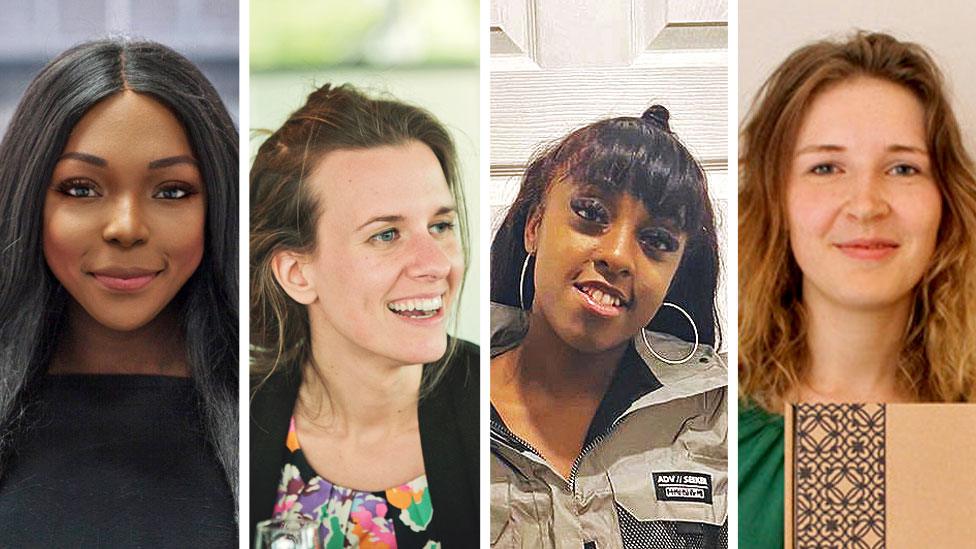Hospitality jobs: Women 'unable to progress' due to low pay
- Published

Nearly three quarters of female hospitality workers have considering quitting their jobs, a survey has claimed
Much more needs to be done to persuade women that hospitality can give them "meaningful career progression", according to leaders in the industry.
Aine Morris of the Bristol Food Union said many are put off by the lack of progression, low pay and unsocial hours.
This is having a detrimental impact on its ability to retain staff, she said.
A recent survey discovered that 71% of female hospitality workers had considering quitting the industry.
Ms Morris said: "Ultimately it is not a level playing field."
She claimed that one of the reasons why hospitality is more of a young person's industry is because of its long shift patterns and weekend work.
One of the questions "is how do we help those people transitioning into careers", she explained.
Lack of progression
"Earning £10 to £12 an hour when you are 24 is OK but not when you are 40 and have two kids you need to earn £30,000 - £40,000.
"A lot of women leave the industry because they don't feel there is progression.
"We as an industry really need to think what meaningful career progression we are giving people to keep them in the industry."
Ms Morris - a director of the Bristol Food Union with 25 years' experience in hospitality - spoke as a survey by workforce management firm Quinyx revealed the disparity between male and female "deskless workers".

Ms Morris says hospitality is "not a level playing field" for women
The term refers to people who cannot perform their roles remotely - of which hospitality is a large sector.
The firm's chief HR officer Toma Pagojute said its 11,000-strong survey discovered 71% of female hospitality workers in the UK had considered quitting over their working conditions.
'Falling short'
And just a quarter of female "deskless" employees said their manager has shared specific steps towards their promotion.
Ms Pagojute said that "women's experiences are consistently falling short across the board" and there needs to be a response to this.
She claimed that 2022 presented an opportunity for "a sustained shift in organisations' priorities" following the disruption of the Covid pandemic.
This would help firms "redress the balance and get employee engagement and wellbeing right for everyone", she said.

How women are faring worse:
71% of female hospitality workers have considered quitting because they are unhappy with their work environment
Only 27% of female workers are comfortable discussing pay rises or wage disparities with managers
46% of female employees do not believe there are a lot of job opportunities open to them based on their skills
Women are more likely to feel pressured by co-workers into taking shifts they do not want to take (45% female / 33% male).
60% of female workers have worked while sick because they could not afford to take time off (49% of male workers).
Just 25% of female workers say their manager has shared specific steps towards their promotion, and 18% say their manager has identified a mentor for them (30% and 25% for male workers)
Source: Quinyx, external

Ms Morris said that many women are employed in management roles but the senior positions which are usually well paid and more flexible still tend to be occupied by men.
'Valuable skills'
This has led lots of women - who have "really valuable skills" - leaving the industry because they feel that they will never be able to attain those jobs, she said.
There is also an issue with many hospitality businesses wanting to expand too quickly - leaving their staff feeling burned out.

Ms Pagojute said that "women's experiences are consistently falling short across the board"
She said: "Lots of women are feeling where does this end? How can we cope?
"We can't keep opening new restaurants and keep on opening things. There needs to be time to reopen and rebuild.
"Any business is an expression of the people who run it and make space for."

Follow BBC West on Facebook, external, Twitter, external and Instagram, external. Send your story ideas to: bristol@bbc.co.uk , external
- Published22 February 2022

- Published22 February 2022

- Published2 February 2022

- Published13 January 2022

- Published15 September 2020

- Published4 March 2022
